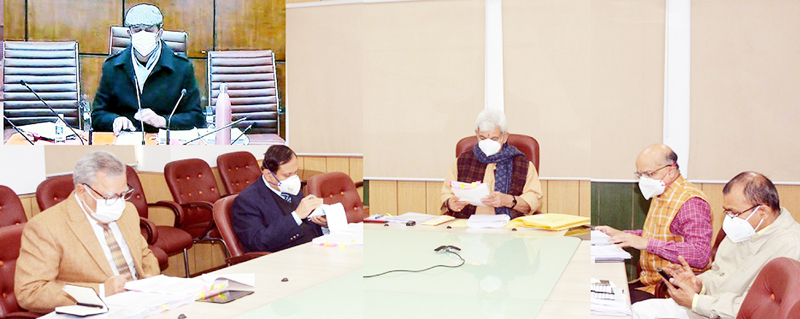
Every Distt to have Asstt Comm Panchayat
* Govt to wind up Sheep Dev Board
Excelsior Correspondent
JAMMU, Feb 13: To further streamline the implementation of J&K Panchayati Raj Act and Rules, the Administrative Council (AC), which met here today under the chairmanship of Lieutenant Governor, Manoj Sinha, approved an overhaul of the field administrative machinery supporting Panchayats by rationalizing various categories of existing posts in the Department of Rural Development and Panchayati Raj.
The reorganization of the Panchayats has become necessary keeping in view that the functioning of the Department has undergone a sea change after the Panchayat elections in 2018 with subsequent devolution of greater funds and functionaries and decentralization of planning and execution functions right down to the Panchayat level. The proposed overhaul in the administrative structure for Panchayats is aimed at strengthening the 3rd- tier of democracy through a cadre of trained professionals, as per the spirit of the 73rd Constitutional Amendment Act.
As a result of the AC decision, every district will now have an Assistant Commissioner Panchayat, a dedicated officer to look after the functioning of Panchayats and coordinate their activities. The officer will report to the Chief Executive Officer of the District Development Council, recently constituted in Jammu & Kashmir.
The decision will give way to a uniform structure of the officials performing the duties of Secretary to Panchayats by re-designating the posts of VLW/MPW and Gram Sevika as Panchayat Secretary.
Likewise, posts such as Mukhya Sevika, Panchayat Supervisor, Lady Project Officer, Cooperative Extension Officer, Plantation Ranger, Road Roller Operator, Katib, and Photographer, which have become redundant, will be utilized for the creation of posts in tandem with contemporary dynamics of the Department.
Further, to streamline the career progression of employees, the posts of Panchayat Inspector Grade I & Grade II will be merged into a single cadre of Panchayat Inspector. Similarly, five different categories of Class IV posts having similar functions and pay scale will be clubbed in a single category as Orderlies to simplify the hierarchical structure.
Meanwhile, the AC also approved the proposal of the Animal, Sheep Husbandry & Fisheries Department to wind up the J&K Sheep & Sheep Products Development Board.
The decision was taken considering that there has been no significant on-ground impact on production and marketing of wool and wool based product.
The Administrative Council further directed the Industries and Commerce Department to prepare a scheme tailored to the marketing needs of wool producers and provide Government support towards ensuring a remunerative price for woollen products.
Meanwhile, with an aim to optimally utilize the demographic dividend of Jammu and Kashmir, the (AC) approved the proposal to register the Mission Youth as a Society under the Societies Registration Act, 1860. This will facilitate establishment of required organizational and administrative structure for proactive outreach and purposeful engagement of the youth of the Union Territory.
The decision is aimed at providing a vibrant medium for youth engagement & empowerment to transform them into ambassadors of peace, prosperity, and development through a sieve of systematic interventions and positive benefaction across the domains of livelihood generation, education/skill development, psycho-social/career counselling, financial assistance, social recognition, sports, and recreation.
To enhance skill and employability of the youth, the Mission has partnered with reputed institutions/organizations of the country including BSE Institute, ICICI Foundation and Ashok Leyland. It will also roll-out skill development courses in various upcoming high employability sectors like banking, financial services, insurance, among others. Besides, two Centres of Excellence in the Automobile sector, one each in Kashmir and Jammu region will be shortly started.
More significantly, to shift the fulcrum of developmental policy towards youth, super-specialized district youth centres shall be established across all the districts of Jammu & Kashmir. These centres are primarily aimed to present a safe, appealing environment with manifestations of hope, security and aspirations of the youth and are planned to offer a first of kind initiative in an environment covering four fundamental contours of youth engagement & empowerment viz.Inform, Inspire, Interact & Innovate.
Mission Youth envisions engaging with 80% of J&K’s youth population over the next five years and transforming them into a propelling force for socio-economic development of Jammu & Kashmir.
To mitigate the issues related to the unscientific disposal of municipal solid waste in Jammu city, the AC also approved the establishment of an Integrated Solid Waste Management (ISWM) project by National Agriculture Cooperative Marketing Federation of India (NAFED).
To implement the project, the Jammu Municipal Corporation (JMC) will sign an agreement with NAFED to set up a 350 MT capacity ISWM plant along with an ancillary bio-CNG generating plant and bio-landfill at Kot Bhalwal, Jammu.
At the estimated project cost of Rs. 74.41 crore and project timeline of 2 years, NAFED will establish a scientific system for waste segregation, processing, and disposal of effluents, emissions, and bio-degradable waste according to the norms of the J&K Pollution Control Board. As per the terms of the agreement, JMC will contribute Rs. 20 crore towards project execution, and will have a share in 50% profit on returns above 20% of equity investment.
Pertinently, NAFED – an apex organization under the Ministry of Agriculture, Government of India, having substantial experience in the management of bio-waste will manage the entire solid waste of Jammu city through the proposed ISWM project for a period of 25 years.
Once operational, the project will check the polluting effect of unscientific disposal of municipal solid waste in water bodies, canals, and landfills, and ensure its sustainable and scientific disposal, besides generating non-conventional renewable energy in the form of Compressed Natural Gas.

